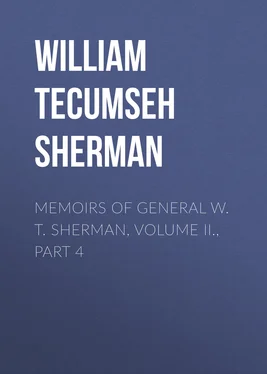William Tecumseh Sherman - Memoirs of General W. T. Sherman, Volume II., Part 4
Здесь есть возможность читать онлайн «William Tecumseh Sherman - Memoirs of General W. T. Sherman, Volume II., Part 4» — ознакомительный отрывок электронной книги совершенно бесплатно, а после прочтения отрывка купить полную версию. В некоторых случаях можно слушать аудио, скачать через торрент в формате fb2 и присутствует краткое содержание. Жанр: Биографии и Мемуары, История, foreign_edu, foreign_antique, foreign_prose, на английском языке. Описание произведения, (предисловие) а так же отзывы посетителей доступны на портале библиотеки ЛибКат.
- Название:Memoirs of General W. T. Sherman, Volume II., Part 4
- Автор:
- Жанр:
- Год:неизвестен
- ISBN:нет данных
- Рейтинг книги:5 / 5. Голосов: 1
-
Избранное:Добавить в избранное
- Отзывы:
-
Ваша оценка:
- 100
- 1
- 2
- 3
- 4
- 5
Memoirs of General W. T. Sherman, Volume II., Part 4: краткое содержание, описание и аннотация
Предлагаем к чтению аннотацию, описание, краткое содержание или предисловие (зависит от того, что написал сам автор книги «Memoirs of General W. T. Sherman, Volume II., Part 4»). Если вы не нашли необходимую информацию о книге — напишите в комментариях, мы постараемся отыскать её.
Memoirs of General W. T. Sherman, Volume II., Part 4 — читать онлайн ознакомительный отрывок
Ниже представлен текст книги, разбитый по страницам. Система сохранения места последней прочитанной страницы, позволяет с удобством читать онлайн бесплатно книгу «Memoirs of General W. T. Sherman, Volume II., Part 4», без необходимости каждый раз заново искать на чём Вы остановились. Поставьте закладку, и сможете в любой момент перейти на страницу, на которой закончили чтение.
Интервал:
Закладка:
I have the honor to be your obedient servant,
W. T. SHERMAN, Major-General United States Army.
As soon as the army had reached Savannah, and had opened communication with the fleet, I endeavored to ascertain what had transpired in Tennessee since our departure. We received our letters and files of newspapers, which contained full accounts of all the events there up to about the 1st of December. As before described, General Hood had three full corps of infantry–S. D. Lee's, A. P. Stewart's, and Cheatham's, at Florence, Alabama–with Forrest's corps of cavalry, numbering in the aggregate about forty-five thousand men. General Thomas was in Nashville, Tennessee, quietly engaged in reorganizing his army out of the somewhat broken forces at his disposal. He had posted his only two regular corps, the Fourth and Twenty-third, under the general command of Major-General J. M. Schofield, at Pulaski, directly in front of Florence, with the three brigades of cavalry (Hatch, Croxton, and Capron), commanded by Major-General Wilson, watching closely for Hood's initiative.
This force aggregated about thirty thousand men, was therefore inferior to the enemy; and General Schofield was instructed, in case the enemy made a general advance, to fall back slowly toward Nashville, fighting, till he should be reenforced by General Thomas in person. Hood's movement was probably hurried by reason of my advance into Georgia; for on the 17th his infantry columns marched from Florence in the direction of Waynesboro', turning, Schofield's position at Pulaski. The latter at once sent his trains to the rear, and on the 21st fell back to Columbia, Tennessee. General Hood followed up this movement, skirmished lightly with Schofield at Columbia, began the passage of Duck River, below the town, and Cheatham's corps reached the vicinity of Spring Hill, whither General Schofield had sent General Stanley, with two of his divisions, to cover the movement of his trains. During the night of November 29th General Schofield passed Spring Hill with his trains and army, and took post at Franklin, on the south aide of Harpeth River. General Hood now attaches serious blame to General Cheatham for not attacking General Schofield in flank while in motion at Spring Hill, for he was bivouacked within eight hundred yards of the road at the time of the passage of our army. General Schofield reached Franklin on the morning of November 30th, and posted his army in front of the town, where some rifle-intrenchments had been constructed in advance. He had the two corps of Stanley and Cox (Fourth and Twenty-third), with Wilson's cavalry on his flanks, and sent his trains behind the Harpeth.
General Hood closed upon him the same day, and assaulted his position with vehemence, at one time breaking the line and wounding General Stanley seriously; but our men were veterans, cool and determined, and fought magnificently. The rebel officers led their men in person to the several persistent assaults, continuing the battle far into the night, when they drew off, beaten and discomfited.
Their loss was very severe, especially in general officers; among them Generals Cleburn and Adams, division commanders. Hood's loss on that day was afterward ascertained to be (Thomas's report): Buried on the field, seventeen hundred and fifty; left in hospital at Franklin, thirty-eight hundred; and seven hundred and two prisoners captured and held: aggregate, six thousand two hundred and fifty-two. General Schofields lose, reported officially, was one hundred and eighty-nine killed, one thousand and thirty-three wounded, and eleven hundred and four prisoners or missing: aggregate, twenty-three hundred and twenty-six. The next day General Schofield crossed the Harpeth without trouble, and fell back to the defenses of Nashville.
Meantime General Thomas had organized the employees of the Quartermaster's Department into a corps, commanded by the chief-quartermaster, General J. Z. Donaldson, and placed them in the fortifications of Nashville, under the general direction of Major-General Z. B. Tower, now of the United States Engineers. He had also received the two veteran divisions of the Sixteenth Corps, under General A. J. Smith, long absent and long expected; and he had drawn from Chattanooga and Decatur (Alabama) the divisions of Steedman and of R. S. Granger. These, with General Schofields army and about ten thousand good cavalry, under General J. H. Wilson, constituted a strong army, capable not only of defending Nashville, but of beating Hood in the open field. Yet Thomas remained inside of Nashville, seemingly passive, until General Hood had closed upon him and had entrenched his position.
General Thomas had furthermore held fast to the railroad leading from Nashville to Chattanooga, leaving strong guards at its principal points, as at Murfreesboro', Deckerd, Stevenson, Bridgeport, Whitesides, and Chattanooga. At Murfreesboro' the division of Rousseau was reenforced and strengthened up to about eight thousand men.
At that time the weather was cold and sleety, the ground was covered with ice and snow, and both parties for a time rested on the defensive. Those matters stood at Nashville, while we were closing down on Savannah, in the early part of December, 1864; and the country, as well as General Grant, was alarmed at the seeming passive conduct of General Thomas; and General Grant at one time considered the situation so dangerous that he thought of going to Nashville in person, but General John A. Logan, happening to be at City Point, was sent out to supersede General Thomas; luckily for the latter, he acted in time, gained a magnificent victory, and thus escaped so terrible a fate.
On the 18th of December, at my camp by the side of the plank-road, eight miles back of Savannah, I received General Hardee's letter declining to surrender, when nothing remained but to assault. The ground was difficult, and, as all former assaults had proved so bloody, I concluded to make one more effort to completely surround Savannah on all aides, so as further to excite Hardee's fears, and, in case of success, to capture the whole of his army. We had already completely invested the place on the north, west, and south, but there remained to the enemy, on the east, the use of the old dike or plank-road leading into South Carolina, and I knew that Hardee would have a pontoon-bridge across the river. On examining my maps, I thought that the division of John P. Hatch, belonging to General Fosters command, might be moved from its then position at Broad River, by water, down to Bluffton, from which it could reach this plank-road, fortify and hold it–at some risk, of course, because Hardee could avail himself of his central position to fall on this detachment with his whole army. I did not want to make a mistake like "Ball's Bluff" at that period of the war; so, taking one or two of my personal staff, I rode back to Grog's Bridge, leaving with Generals Howard and Slocum orders to make all possible preparations, but not to attack, during my two or three days' absence; and there I took a boat for Wassaw Sound, whence Admiral Dahlgren conveyed me in his own boat (the Harvest Moon) to Hilton Head, where I represented the matter to General Foster, and he promptly agreed to give his personal attention to it. During the night of the 20th we started back, the wind blowing strong, Admiral Dahlgren ordered the pilot of the Harvest Moon to run into Tybee, and to work his way through to Wassaw Sound and the Ogeechee River by the Romney Marshes. We were caught by a low tide and stuck in the mud. After laboring some time, the admiral ordered out his barge; in it we pulled through this intricate and shallow channel, and toward evening of December 21st we discovered, coming toward us, a tug, called the Red Legs, belonging to the Quarter-master's Department, with a staff-officer on board, bearing letters from Colonel Dayton to myself and the admiral, reporting that the city of Savannah had been found evacuated on the morning of December 21st, and was then in our possession. General Hardee had crossed the Savannah River by a pontoon-bridge, carrying off his men and light artillery, blowing up his iron-clads and navy-yard, but leaving for us all the heavy guns, stores, cotton, railway-cars, steamboats, and an immense amount of public and private property. Admiral Dahlgren concluded to go toward a vessel (the Sonoma) of his blockading fleet, which lay at anchor near Beaulieu, and I transferred to the Red Legs, and hastened up the Ogeechee River to Grog's Bridge, whence I rode to my camp that same night. I there learned that, early on the morning of December 21st, the skirmishers had detected the absence of the enemy, and had occupied his lines simultaneously along their whole extent; but the left flank (Slocum), especially Geary's division of the Twentieth Corps, claimed to have been the first to reach the heart of the city.
Читать дальшеИнтервал:
Закладка:
Похожие книги на «Memoirs of General W. T. Sherman, Volume II., Part 4»
Представляем Вашему вниманию похожие книги на «Memoirs of General W. T. Sherman, Volume II., Part 4» списком для выбора. Мы отобрали схожую по названию и смыслу литературу в надежде предоставить читателям больше вариантов отыскать новые, интересные, ещё непрочитанные произведения.
Обсуждение, отзывы о книге «Memoirs of General W. T. Sherman, Volume II., Part 4» и просто собственные мнения читателей. Оставьте ваши комментарии, напишите, что Вы думаете о произведении, его смысле или главных героях. Укажите что конкретно понравилось, а что нет, и почему Вы так считаете.












